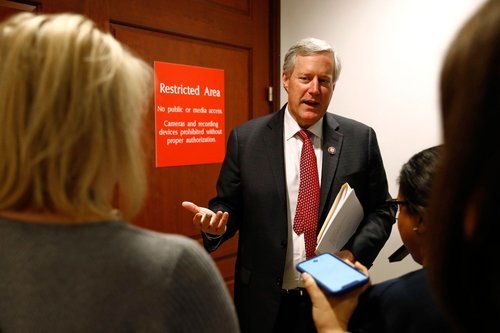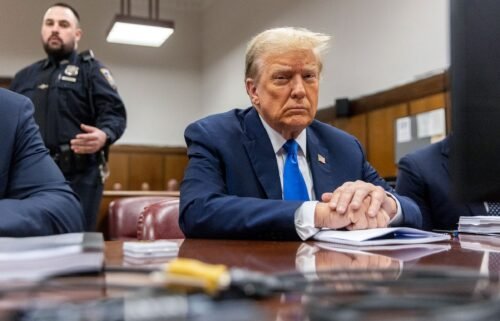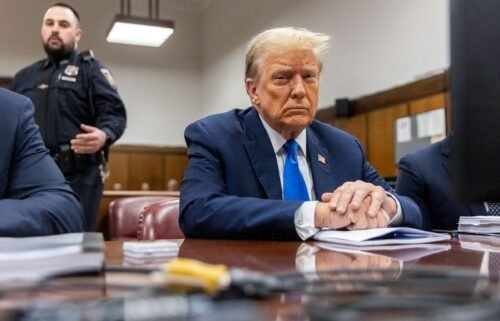Inside the room: Transcripts show Republicans are anything but sidelined in impeachment inquiry

Before the questioning even begins, Republicans call foul.
“This is a partisan investigation,” declared Rep. Jim Jordan, an unofficial leader of the GOP’s impeachment response, at the start of a closed-door deposition with the ousted US ambassador to Ukraine.
“You are willfully selecting facts and omitting others,” said Rep. Mark Meadows, another Republican leader of the impeachment rebuttal efforts, as investigators were preparing to interview a former State Department adviser.
“If we’re going to continue this circus, I, at least, would like to know what time the circus begins,” complained Rep. Devin Nunes, the top Republican on the House Intelligence Committee, ahead of an interview with the US ambassador to the European Union.
In a pattern established over four closed-door depositions whose transcripts were released this week, Republicans have used their allotted time to question the impeachment inquiry’s validity and accuse Democrats of shutting them out of the process.
But for all of the Republicans’ complaints about unfairness, the transcripts indicate they were fully involved in the questioning of witnesses during the sometimes-contentious closed door hearings. Over the course of the lengthy sittings, Republicans, Democrats and witnesses’ lawyers have clashed over the propriety of questions and the terms of the proceedings.
It mirrors their public attempts to discount the impeachment probe, including an attempt to storm the secure hearing room where the depositions have occurred.
The transcripts provide the fullest picture yet of the closed depositions, which have occurred over long days inside a stuffy room in the basement of the US Capitol. As the inquiry enters a more public phase, the back-and-forth that transpired in private provides a likely preview of upcoming open hearings, where procedural matters and questions of the impeachment probe’s legitimacy are likely to arise.
The loudest voices
Jordan, who has complained loudly in public about what he says are unfair rules surrounding the proceedings, has emerged as the loudest voice in the hearing room lambasting the guidelines set out by Democrats. In a set of opening statements, he alleges President Donald Trump is being denied due process, casts the testimony as a sham that denies Republicans equal standing, and claims he and his GOP colleagues “should have the ability to present evidence bearing on the credibility of testifying witnesses.”
Jordan, who does not currently sit on the House Intelligence Committee, is likely to move temporarily to the panel for the public hearings, according to people familiar with the matter, where he can continue battling Democrats over the inquiry’s legitimacy.
Other Republicans who have played an active role in the closed depositions — such as Meadows and Rep. Lee Zeldin of New York — do not sit on the House Intelligence Committee. But they have aggressively questioned Democrats about their tactics.
Before the very first deposition, from former special envoy to Ukraine Kurt Volker, Republicans raised objections when House Intelligence Chairman Adam Schiff suggested the questioning would be conducted by staff members and not the members themselves.
Later, even after Republican members had questioned Volker, Meadows insisted Schiff clarify the rules — and wouldn’t accept an answer from Democratic Rep. Eric Swalwell while Schiff was absent.
“Well, when Chairman Schiff gets back, we’ll ask someone who is really in charge,” Meadows said.
Credibility
If Republicans were hoping to poke holes in the credibility of the administration officials coming forward to recount their concerns at the President’s approach to Ukraine, they did not appear successful, at least in the first phase on the inquiry.
Nor were they able to fully discount the allegation from several of the witnesses that Trump was overseeing an unofficial policy in Ukraine meant to surface dirt on his political rivals.
Instead, the Republicans spent long stretches of time inquiring about witnesses’ interactions with other people involved in the inquiry. They quizzed one witness, the former US ambassador in Kiev Marie Yovanovitch, about how her opening statement made it to the news media.
When Republicans did drill down on the finer details of the inquiry, they often asked about specific Ukrainian officials the witnesses didn’t know or ventured questions meant to boost suggestions of wrongdoing by former Vice President Joe Biden and his son Hunter. There is no evidence of wrongdoing in Ukraine by either Biden.
Zeldin asked Gordon Sondland, the US ambassador to the European Union, whether he had “a problem with the vice president’s son being paid $50,000 a month in Ukraine,” prompting an objection from Schiff, who said the line of inquiry was bringing the deposition “very far afield.”
After some back-and-forth, Sondland answered: “I have no opinion.”
Meadows, meanwhile, tried to bait Sondland into saying other countries have quid pro quos with Ukraine in exchange for corruption investigations, prompting Sondland to compare his questioning to the mafia comedy “My Cousin Vinny.”
Process complaints
But if Republicans used some of their time looking to undercut Democrats’ claims against Trump, they used the rest complaining about the process.
“If we’re going to play by the same set of rules, Mr. Chairman, we need to know what is fair for everyone,” Meadows said at the start of an interview with Michael McKinley, a former senior adviser to Secretary of State Mike Pompeo. He was asserting that some Democrats had selectively leaked portions of previous testimony to the public.
In the Yovanovitch deposition, the Republicans interjected when it became known the former envoy’s opening statement had been obtained by the media, which they repeatedly attempted to question her about. Her lawyer sought to block those questions, repeating over and over she wasn’t going to answer.
Eventually, Yovanovitch responded to an inquiry on whether she thought her opening statement should be provided to the press.
“I actually don’t really have an opinion on that,” she said.
Later, during his time to question Yovanovitch, Jordan asked about a conversation she had with George Kent, a State Department official, about Trump’s July 25 phone call with Ukrainian President Volodymyr Zelensky after she was recalled from her post, suggesting it was unusual since she was long no longer the ambassador.
Meadows, meanwhile, asked Yovanovitch why she was called “Masha.”
“Despite my posting to Ukraine,” she said, “I’m actually half Russian, and it’s a Russian nickname.”
“I yield back,” he responded.



